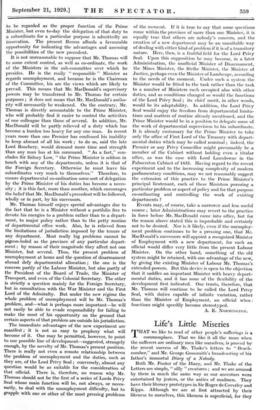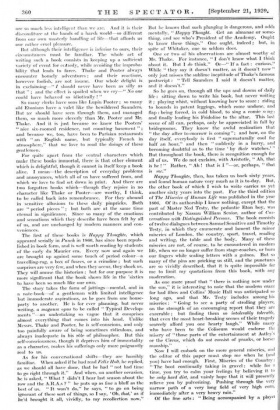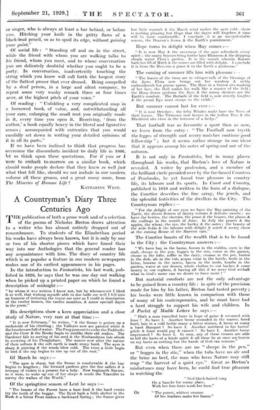Life's Little Miseries
THAT we like to read of other people's sufferings is a commonplace. That we like it all the more when the sufferers are ordinary men like ourselves, is proved by the recent success of Mr. Thake's letters to " Beach- comber," and Mr. George Grossmith's broadcasting of his father's immortal Diary of a Nobody.
Both Mr. Pooter of the Diary, and Mr. Thake of the Letters are simple, " silly " creatures ; and we are amused by them in much the same way as our ancestors were entertained by jesters, or the antics of madmen. They have their literary prototypes in Sir Roger de Coverley and Kipps. Although we are at first attracted by their likeness to ourselves, this likeness is superficial, for they are so much less intelligent than we are. And it is their discomfiture at the hands of a harsh world—so different from our own masterly handling of life—that affords us our rather cruel pleasure.
But although their intelligence is inferior to ours, their circumstances must be familiar. The whole art of writing such a book consists in keeping up a sufficient variety of event for ccCedy, while avoiding the improba- bility that leads to farce. Thake and Pooter always encounter homely adventures ; and their reactions, however foolish, are not insane. Our whole delight is in exclaiming—" I should never have been as silly as that " ; and the effect is spoiled when we cry—" No one could have behaved so idiotically ! "
So many clerks have sons like Lupin Pooter ; so many old Etonians have a valet like the bewildered Saunders.
But we should have seen through them, and managed them, so much more cleverly than Mr. Pooter and Mr. Thake. And it is just because we know the Pooters' " nice six-roomed residence, not counting basement " ; and because we, too, have been to Parisian restaurants with " an English name, but typically French in atmosphere," that we love to read the doings of these gentlemen.
For quite apart from the central characters which make these books immortal, there is that other element which is delightful, though it cannot in itself keep a book alive. I mean—the description of everyday problems and annoyances, which all of us have suffered from, and which we love to find set down in print. And there are two forgotten books which—though they rejoice in no character like Thake or Pooter—are worthy, I think, to be called back into remembrance. For they abound in sensitive allusions to these daily pinpricks. Both are " period pieces " ; but both are at the same time eternal in significance. Since so many of the emotions and sensations which they describe have been felt by all of us, and are unchanged by modern manners and con- veniences.
The first of these books is Happy Thoughts, which appeared serially in Punch in 1866, has since been repub- lished in book form, and is well worth reading by students of the early du Maurier era. Every now and again we are brought up against some touch of period colour—a travelling-rug, a box of fusees, or a crinoline ; but such surprises are very few, and when they occur, they shock us.
They will amuse the historian : but for our purpose it is more significant that the book shows life in the 'sixties to have been so much like our own.
The story takes the form of jottings—mental, and in a note-book—of a gentleman with limited intelligence but immoderate aspirations, as he goes from one house- party to another. He is for ever planning, but never writing, a magnum opus to be called " Typical Develop- ments "—an undertaking so vague that it comprises almost everything that comes into his head. Unlike Messrs. Thake and Pooter, he is self-conscious, and only too painfully aware of being sometimes ridiculous, and always inadequate in his role of philosopher. But this self-consciousness, though it deprives him of immortality as a character, makes his sufferings only more poignantly real to us.
As for his conversational shifts—they are horribly familiar. When asked if he had read Felix Holt, he replied, as we should all have done, that he had " not had time to go right through it." And when, on another occasion, he is asked, " What ? didn't I hear last season about the row and the A.R.A.s ? " he puts up as fine a bluff as the best of us. " It won't do," he says, " to go on being ignorant of these sort of things, so I say, ' Oh, that,' as if he'd brought it all, vividly, to my recollection now." But he knows that such plunging is dangerous, and adds mentally, " Happy Thought. Get an almanac or some- thing, and see who's President of the Academy. Ought to know these things." One ought, indeed ; but, in spite of Whitaker, one so seldom does.
One or two of his observations are almost worthy of Mr. Thake. For instance, " I don't know what I think about it. But I do think." Or—" If a fact : curious." While " they say it doesn't matter, as it doesn't now " only just misses the sublime ineptitude of Thake's famous postscript : " Tell Saunders I said it doesn't matter, and it doesn't."
So he goes on, through all the ups and downs of daily life : sitting down to write his book, but never writing it ; playing whist, without knowing how to score : riding to hounds in patent leggings, which come undone, and flap : being forced, in cold blood, to sing a comic sc ng and finally leading his Fridoline to the altar. This last scene of all can, perhaps, only be appreciated in full by bridegrooms. They know the awful realization that " the day after to-morrow is coming"; and how, on the day itself, everybody is first " supernaturally cool for half an hour," and then " suddenly in a hurry, and becoming doubtful as to the time by their watches.' " But throughout the book, there is recognition enough for all of us. We do not exclaim, with Aristotle, " Ah, that is he ! " Rather, " Ah ! that is I "—or, perhaps, " that is me."
Happy Thoughts, then, has taken us back sixty years, and found human nature very much as it is to-day. But, the other book of which I wish to write carries us yet another sixty years into the past. For the third edition of The Miseries of Human Life was published in the year 1806. Of its authorship I know nothing, except that the part of Master Ned Testy, the pedantic Eton boy, was contributed by Nassau William Senior, author of Con- versations with Distinguished Persons. The book consists of twelve dialogues between Samuel Sensitive and Timothy Testy, in which they enumerate and lament the minor miseries of London, the country, sport, travel, reading and writing, the table and the body. Many of these miseries are not, of course, to be encountered in modern life, when we no longer suffer from stage-coaches, or burn our fingers while sealing letters with a guinea. But so many of the pins are pricking us still, and the punctures are so vividly described, that it is quite impossible for me to limit my quotations from this book, with any moderation.
As one more proof that " there is nothing new under the sun," it is interesting to note that the modern craze for bad films and Collins' • Music Hall was anticipated so long ago, and that Mr. Testy includes among his miseries : " Going to see a party of strolling players, on the strength of an encouraging report that they arc execrable ; but finding them so intolerably tolerable, that even the most heart-breaking scenes of their tragedy • scarcely afford you one hearty laugh." While many who have been to the Coliseum would endorse the misery of "those parts of the entertainment at Astley's or the Circus, which do not consist of pranks, or horse- manship."
Now I will embark on the more general miseries, and the editor of this paper must stop me when he (and you) have had enough. First, Miseries of the Country : " The boot continually taking in gravel ; while for a time, you try to calm your feelings by believing it to be only hard dirt, and vainly hope that it will presently relieve you by pulverizing. Pushing through the very narrow path of a very long field of very high corn, immediately after a very heavy rain."
Of the fine arts : " Being accompanied by a playel or singer, who is always at least a bar behind, or before you. Hitching your knife in the gritty flaws of a black-lead pencil, so as to spoil its edge, without gaining your point."
Of social life : " Standing off and on in the street, while the friend with whom you are walking talks to his friend, whom you meet, and to whose conversation you are delicately doubtful whether you ought to be a party. In conversation, inadvertently touching the string which you know will call forth the longest story of the flattest proser that ever droned. Being compelled by a deaf person, in a large and silent company, to repeat some very washy remark three or four times over, at the highest pitch of your voice."
Of reading : " Unfolding a very complicated map in a borrowed book. of value, and, notwithstanding all your care, enlarging the small rent you originally made in it, every time you open it. Receiving, ' from the author,' a book equally heavy in the literal and figurative senses ; accompanied with entreaties that you would candidly set down in writing your detailed opinions of it in all its parts."
If we have been inclined to think that progress has overcome the discomforts incident to daily life in 1806, let us think upon these quotations. For if you or I were to embark to-morrow on a similar book, which should make people declare that they knew so well just what that felt like, should we not include in our modern volume all these groans, and a great many more, from The Miseries of Human Life ?
KATHARINE WEST.














































 Previous page
Previous page